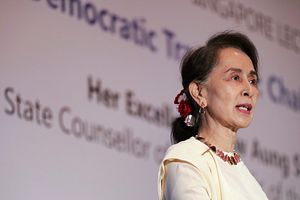Myanmar State Chancellor Aung San Suu Kyi’s speech at the 43rd Singapore Lecture on August 21, 2018 clearly illustrates the diplomatic and rhetorical strategy that Myanmar is employing to shift the blame from itself to Bangladesh for the delay in the repatriation of the Rohingya refugees, all the while disregarding the pertinent issues of justice for the atrocities, the creation of an atmosphere that would incentivize the voluntary, safe, and dignified repatriation of the Rohingyas and guaranteeing the restitution of their rights and properties.
Three key excerpts from the speech:
- “The returnees have to be sent back by Bangladesh. We can only welcome them at the border.”
- “Bangladesh would also have to decide how quickly they want the process to be completed.”
- “We have been ready to receive them [i.e. the Rohingyas] since the 23rd of January [of 2018], in accordance with the MOU that was signed last November [of 2017].”
Suu Kyi’s statements regarding the repatriation of the Rohingya refugees indicate, albeit quite disingenuously, that Myanmar has always been ready to welcome back the Rohingyas, even though she and the entire state apparatus refuses to call them by their ethnic name. Her statements also peg the delay in the repatriation process as Bangladesh’s fault, but Suu Kyi did not go into further detail as to why and how Bangladesh is delaying the implementation of the Memorandum of Understanding (MOU) signed with Myanmar on the issue of the repatriation of Rohingya refugees.
It seems Myanmar is trying to diplomatically and rhetorically, outmaneuver Bangladesh on the issue of refugees repatriation and trounce calls for justice of the atrocities committed in Rakhine in and after August 2017. It is high time that Bangladesh toughen its stance on the issue of repatriation and adopt appropriate measures to diplomatically and legally refute Myanmar’s distorting rhetoric and to pressure it to perform its stated obligation vis-à-vis the Rohingyas.
Toward that end, Bangladesh should issue statements refuting and rectifying the claims and facts stated by Suu Kyi in her Singapore speech by highlighting the inconsistencies and misrepresentations, and the actual situation regarding the repatriation process. Bangladesh’s silence and non-refutation of such false claims and misrepresentations may release Myanmar from international scrutiny and pressure and thereby transfer the blame for the lack of visible progress on the repatriation front to Bangladesh.
Silence also renders credibility to Myanmar’s claims that, since January 23, 2018, it has been acting in good faith and is doing or has done everything necessary from its end to initiate the “voluntary, safe, and dignified” repatriation of the Rohingyas — which is not the case as has been evidenced by numerous reports and human rights organizations. Furthermore, it is estimated that every day, on average, Bangladesh is spending $2 million, discounting foreign aid, on sheltering the Rohingya refugees. Thus, it is very much in Bangladesh’s interest to speed up the process of repatriation and it further strengthens the argument for Bangladesh’s claim for reparations from Myanmar in the future.
Recently, at the behest of Myanmar, Bangladesh has agreed to change the terminology used to describe Rohingya refugees on the identity cards they are issued from “Myanmar nationals” to “displaced persons from Rakhine State.” This alteration, though seemingly cosmetic, indicates that Myanmar does not intend to recognize the Rohingyas as citizens nor does it intend on granting them citizenship rights. The granting of citizenship rights is a necessary precondition for voluntary repatriation according to the Rohingya refugees. Therefore, by not guaranteeing citizenship rights to the Rohingyas, Myanmar is in fact diminishing, if not ending ,the prospect of the Rohingya’s voluntary repatriation. Bangladesh, by agreeing to such an alteration — whatever may have been the reason behind it — may have granted legitimacy to Myanmar’s claims, and impaired its own interests in the quick and voluntary repatriation of the refugees.
Stacking on pre-existing fears and concerns, Human Rights Watch recently published a report alleging that many Rohingya returnees have been tortured and forced to confess that they are or were members of the Arakan Rohingya Salvation Army (ARSA) by the Myanmar Border Guard Police (BGP). Nonetheless, Myanmar expects that the international community would deem the State Chancellor’s statements and consequently, the State’s intentions, to be honest, sincere, and founded on good faith. However, the reality may be the exact opposite. It is feared that Myanmar is only playing for time, awaiting the moment the international community loses interest in the Rohingyas and moves on to the next ensuing humanitarian crisis.
Farhaan Uddin Ahmed is a Researcher of Public International Law and Lecturer at the School of Law, BRAC University. He has an LLM from the University of Cambridge. Twitter: @FarhaanAhmed

































